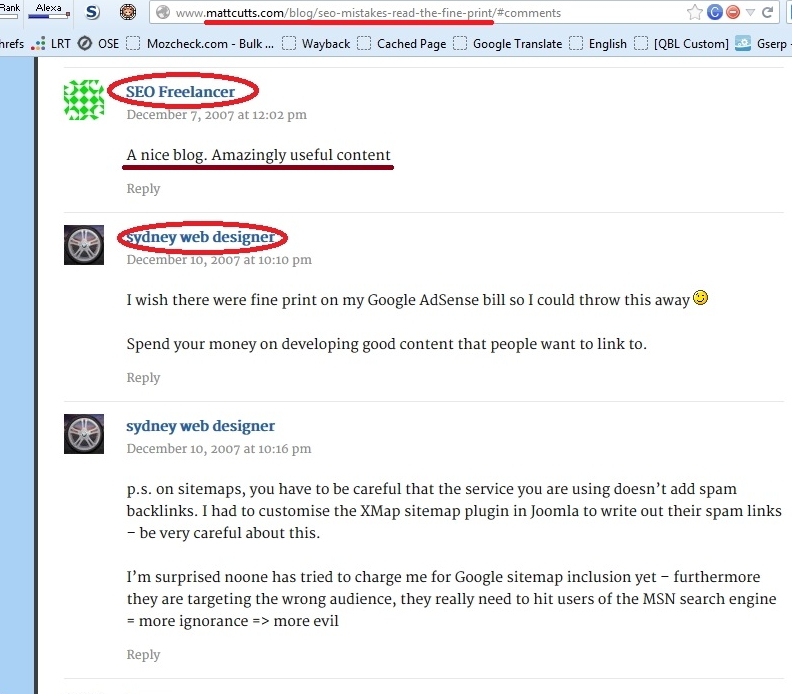Why Google is Spreading Fear, Uncertainty, and Doubt on Guest Posting
If you haven’t been keeping up, this year Google has launched a major Fear, Uncertainty, and Doubt (FUD) campaign against the practice of guest blogging.
Guest blogging is the practice of writing posts on other related blogs in order to expose your company or site to their audiences. It is generally done on relevant sites and is… or was… considered a white hat practice if there ever was one. Certainly a guest post requires a link back to your site for interested readers and since guest posts are editorially approved and usually on topic with the blog, by normal conventions, guest post links should be do-follow links… After all, do-follow links are the ‘default’ for links in editorial content and links in general.
 There were earlier signs and hints from John Mueller but for the most part, all started with Matt Cutt’s proclamation on January 20, 2014 on “The Decay and Fall of Guest Blogging for SEO”. Both before and after this there had been ongoing take downs for link networks which were not surprising to anyone. But then on March 18, Cutts gave an impending warning on Twitter and then the manual penalty of what appeared to be a legitimate community for guest blogging, MyBlogGuest(.com), run by Ann Smarty (story covered on SEW). This manual penalty on My Blog Guest coincided with a number of other reported manual penalties on sites who had used MBG to facilitate guest posts at least once in the past. The connection was clear that Google was treating this community like a manipulative link network and was not just hitting the facilitator. The witch hunt even seemed to extend to sites that linked to MBG as evidenced by Doc Sheldon’s Penalty.
There were earlier signs and hints from John Mueller but for the most part, all started with Matt Cutt’s proclamation on January 20, 2014 on “The Decay and Fall of Guest Blogging for SEO”. Both before and after this there had been ongoing take downs for link networks which were not surprising to anyone. But then on March 18, Cutts gave an impending warning on Twitter and then the manual penalty of what appeared to be a legitimate community for guest blogging, MyBlogGuest(.com), run by Ann Smarty (story covered on SEW). This manual penalty on My Blog Guest coincided with a number of other reported manual penalties on sites who had used MBG to facilitate guest posts at least once in the past. The connection was clear that Google was treating this community like a manipulative link network and was not just hitting the facilitator. The witch hunt even seemed to extend to sites that linked to MBG as evidenced by Doc Sheldon’s Penalty.
Whether or not the penalty on MBG was justified, it least it should be clear to anyone that there are much blacker hats Google could have chosen to go after, but rather than go after any of the hundreds of pure link networks, they chose My Blog Guest which was both much more legitimate, arguably not a network, and also more well known. This is why I classify it as a PR/FUD action, not a webspam action. But let’s dispense with the popcorn and get to the real question…
Why would Google launch a FUD campaign against Guest Blogging?
Let’s start with two reminders. First, guest blogging can be a great method to expose your brand or product to audiences on relevant sites. That’s obvious. Second, some of the best content on the web happens to be in guest posts. This should be equally obvious.
So why is Google taking such an extreme stance almost (but not quite) to the point of saying dofollow links on guest posts are manipulative, period?
I suspect the answer has nothing to do with content quality. I repeat, Google’s issue with guest blogging has little or nothing to do with content quality itself. It actually has to do with an unresolvable loophole in their algorithm in the same vein that paid links fall into. Specifically, the algorithm cannot distinguish between an organic link, a guest post, and for that matter, a paid link. In short, guest posts are being treated as too powerful by Google’s algorithm and Google has no way to tune it down.
Why can’t the algorithm distinguish guest posts from ‘organic’ posts?
Guest post links are indistinguishable from organic links simply because not every blog or author uses an established authorship system (G+ authorship, Gravatar, etc…) and not every guest post is going to be placed in a special neat “guest post” category telling Google what it is. Therefore, guest post links must be treated as identical to relevant organic links in blog posts. You might be asking, “So what?” So consider this from a search engine perspective. Should a site with 10 organic links on relevant sites be considered with equal ‘confidence’ to a site that obtained 10 guest posts on relevant sites? If you think of links in terms of “votes”, certainly not. The organic links mean 10 people found the site genuinely useful or interesting enough to link to, while the 10 guest posts mean 10 bribed votes (bribed with content, usually average content, possibly great content, but still bribed with it either way). Certainly I don’t see why well written guest posts don’t deserve a link for both visitors and search engines, but the bottom line here is that, all else equal, real organic links ought to be treated as more valuable in Google’s eyes, and in the case of guest posts, they are not able to make this distinction.
So in short, guest posts links are being treated as “too powerful”, that is, more powerful than they “deserve” relative to an actual organic link. Again, I don’t mean this as my own judgment, just as a hypothetical view from Google’s perspective as a link-driven search engine.
The Solution: Spread The FUD
Given that there is no present algorithmic solution, Google seems to have decided that high profile manual policing/penalty action combined with other generous doses of FUD is the best solution to limit the use of links in guest posts. The uncertainty and doubt, in the form of ambiguity on exact rules and policies, is to limit the practice as a whole.
So is this just deja vu of crack downs on link networks, blog networks, paid links, and unnatural links that the algorithm can’t handle? Not Quite…

As we have already seen many times, Google only uses mass manual penalties on link methods the algorithm cannot adequately address. The difference here is that link networks, link exchanges, paid links, and other heavily penalized link methods are clearly manipulative link types but guest blogging is largely still a legitimate practice and should remain this way.
Will Guest Blogging with Dofollow Links Die?
Despite all the FUD, this would be almost inconceivable. Guest blogging will not die and guest posts with dofollow links will not die. Why? First, as discussed above, the action would be entirely manual because algorithms can’t pick these links up. Also, if dofollow guest posts were penalized unconditionally, the amount of collateral damage to sites that were following the best practices of their time would be massive. More importantly, there is nothing fundamentally wrong about a guest post with a dofollow link… At its core guest blogging is a white hat method. It is about exposing your site, company, or product to new audiences. In it’s history of algorithm updates and penalties, Google has never been able to enforce nofollow links for any link type. Dofollow links are the default, nofollow are the artificial links; special cases. The average blogger, webmaster, or business owner may know nothing about SEO or nofollow/dofollow links but they have every right to accept guest posts if useful or well written and relevant to their site. ‘Banning’ dofollow links in guest posts would not only require a massive amount of manpower to enforce. It would also be content suicide. As much as we like to pretend otherwise, the link is part of the reason for writing guest posts, great ones that relevant authority sites will accept. Dofollow links in guest posts are not going away but they are going to need to be done much more safely.
Guest Post Best Practices
If you don’t want to be penalized for guest posts, here are some suggestions on doing it right:
1. Post on relevant and authority sites only. This obviously implies well written content but quality content by itself is meaningless without placement on strict quality sites. Spammy sites accepting every type of guest post are just link farms asking for a penalty which means the link is a liability, not an asset.
2. Do not use pure commercial or ‘money’ keywords as anchor text. Compound keywords like “learn about [money keyword] here” are considerably safer, as are brand name, naked URLs, and other generic anchors like “learn more”.
3. Don’t be greedy. If there are links in the content, link to other relevant authorities besides your own site whenever appropriate.
Following these guidelines and making sure guest posts are just a part of the link profile should keep the site safe while giving you powerful relevant links and sources of traffic besides Google.
About Daniel Delos
Daniel is the founder of Rewind SEO and has worked on hundreds of Google penalty analyses and recovery projects, recovering both manual and algorithm penalties. He has almost two decades of total SEO experience and has worked almost exclusively on risk auditing and penalty prevention/recovery since 2014.
- Web |
- More Posts(14)


